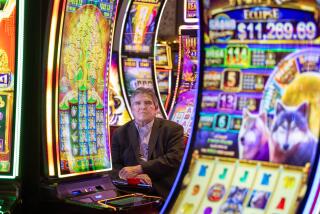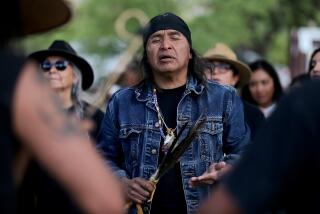In this war, it’s Indian versus Indian
As Highway 16 courses through rural east-central Mississippi, running past stories-tall pine trees standing ten-hut at its edges, it eventually comes to a glittering outpost that embodies the hopes of the Mississippi Band of Choctaw Indians.
On one side of the highway stands the Golden Moon Hotel & Casino, on the other, the Silver Star Hotel & Casino.
The Silver Star opened in 1994, the Golden Moon nearly a decade later. Together, with construction costing several hundred million dollars, these giant ATMs for the tribe are known as the Pearl River Resort, named for the nearby waterway.
For the Choctaw, they symbolize sovereignty from the U.S. government that for so long was its bitter enemy.
But in recent months, some Choctaws have begun waging a new war against what they call an oppressive government: their own.
“First, it was the U.S. government doing it to the Choctaws. Now, it’s the Choctaws doing it to the Choctaws,” said one tribal employee at the resort who spoke on the condition of anonymity for fear of being reprimanded.
At issue is a disputed election for tribal chief and an FBI investigation centered on the casinos.
In mid-July, citing voting irregularities, specifically that some polls stayed open later than permitted, the tribal council threw out the results of a run-off election in which incumbent Chief Beasley Denson lost to council member Phyliss Anderson.
Less than a week later, about 40 FBI agents raided the casinos, seizing hard drives and documents in an investigation that, Denson told the Clarion-Ledger newspaper, is partly related to the tribe’s relationship with an Atlanta-based company that manages the resort and another casino. Beyond that, Denson has said, he knows nothing about the investigation.
Anderson had previously called for an audit on the casinos and more transparency in the tribe’s spending. For some tribal members, the FBI investigation shows that her criticism was prophetic. They say the nullified election proves another point — that their government is unresponsive to the 10,000-member tribe.
Denson has defended the management of the tribe since he was elected chief four years ago. He has said the tribe has prospered under his leadership.
One thing, however, is certain: The previously tranquil tribe has been at unrest. A new election pitting Denson against Anderson is scheduled Tuesday, and tribal members tell of strained friendships and an atmosphere of uneasiness and hard feelings.
“It’s getting out of hand,” said Gwen Willis, 59, who owns a thrift shop not far from tribal headquarters. “People are being ugly, angry.”
Several tribal employees say they have been warned not to speak publicly about the election or the management of the tribe.
Said a tribal employee who works at the resort: “Just a slip of the tongue can put you out of a job.” The tribal government has denied that employees have been threatened or intimidated.
With more than 7,000 full-time employees, the Choctaws are among Mississippi’s five-largest private employers. The latest economic study on the tribe, conducted by Mississippi State University in 2002, found the tribe pumped $1.2 billion into the state economy that year.
The resort, a few miles west of the town of Philadelphia, contributes the vast majority of that figure. The most striking part of the complex is the 17,000-square-foot geodesic sphere that shimmers moon-like atop the Golden Moon Hotel & Casino, overlooking patrons who will soon contribute one busted hand, one unlucky lever pull or one errant dice throw to the tribe’s coffers.
Much of the tribe’s economic success is attributed to Denson’s predecessor, the late Phillip Martin, who was known as the “Moses of the Choctaws” because he led the tribe from poverty to prosperity through economic development.
But the recent scandal has shaken the tribe’s financial foundation.
Two days after the feds came, Moody’s Investors Service downgraded $200 million in securities borrowed by the Choctaw Resort Development Enterprise to junk bond status.
Moody’s stated the investigation may “indicate potential internal control weaknesses and could affect Choctaw’s casino operations in the future.”
In August, Price Waterhouse Coopers quit as the outside auditor for the tribe’s casinos.
Calls and emails seeking comment were not returned, but Denson is addressing concerns, sometimes in quiet. One afternoon a few days after the raid, Denson walked into Willis’ thrift shop for a meeting.
Vicky Rangel, 52, who sells phone service for an Internet-based company, was there along with Willis. She and Willis pressed the chief for more transparency in government. “I’m going to try,” they said he told them.
Rangel and Willis said they replied: “Well, if you don’t, we’re going to assume you’re hiding something.”
Though the controversy pits Choctaw against Choctaw, some tribal members grumble privately about the role of the FBI, calling its presence another reminder of unwanted federal intervention in tribal affairs.
That fact that the FBI’s nearest office is based in Jackson probably doesn’t help, symbolically. The city is named after President Andrew Jackson, who signed the Indian Removal Act in 1830 that forced thousands of southern tribes from their lands and into the Great American Desert, which became Indian Territory — or as it’s known today, Oklahoma.
According to Judith Nies book “Native American History,” about 13,000 Choctaws left, 4,000 of whom died on the Trail of Tears. Nearly 7,000 defied the order, stayed and, eventually, were granted land for a reservation in Mississippi.
Highway 16 can take you there today. It divides the casinos that anchor the tribe, which is now divided itself.
More to Read
Start your day right
Sign up for Essential California for news, features and recommendations from the L.A. Times and beyond in your inbox six days a week.
You may occasionally receive promotional content from the Los Angeles Times.






